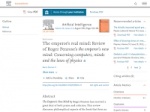
Chatbot listing, virtual agents, virtual assistants, chat bot directory, conversational agents, virtual human news, chatterbot list
NEWS: Chatbots.org survey on 3000 US and UK consumers shows it is time for chatbot integration in customer service!read more..
Review of Roger Penrose's the emperor's new mind
 The Emperor's New Mind by Roger Penrose has received a great deal of both praise and criticism. This review discusses philosophical aspects of the book that form an attack on the “strong” AI thesis. Eight different versions of this thesis are distinguished, and sources of ambiguity diagnosed, including different requirements for relationships between program and behaviour. Excessively strong versions attacked by Penrose (and Searle) are not worth defending or attacking, whereas weaker versions remain problematic. Penrose (like Searle) regards the notion of an algorithm as central to AI, whereas it is argued here that for the purpose of explaining mental capabilities the architecture of an intelligent system is more important than the concept of an algorithm, using the premise that what makes something intelligent is not what it does but how it does it. What needs to be explained is also unclear: Penrose thinks we all know what consciousness is and claims that the ability to judge Gödel's formula to be true depends on it. He also suggests that quantum phenomena underly consciousness. This is rebutted by arguing that our existing concept of “consciousness” is too vague and muddled to be of use in science. This and related concepts will gradually be replaced by a more powerful theory-based taxonomy of types of mental states and processes. The central argument offered by Penrose against the strong AI thesis depends on a tempting but unjustified interpretation of Gödel's incompleteness theorem. Some critics are shown to have missed the point of his argument. A stronger criticism is mounted, and the relevance of mathematical Platonism analysed. Architectural requirements for intelligence are discussed and differences between serial and parallel implementations analysed.
The Emperor's New Mind by Roger Penrose has received a great deal of both praise and criticism. This review discusses philosophical aspects of the book that form an attack on the “strong” AI thesis. Eight different versions of this thesis are distinguished, and sources of ambiguity diagnosed, including different requirements for relationships between program and behaviour. Excessively strong versions attacked by Penrose (and Searle) are not worth defending or attacking, whereas weaker versions remain problematic. Penrose (like Searle) regards the notion of an algorithm as central to AI, whereas it is argued here that for the purpose of explaining mental capabilities the architecture of an intelligent system is more important than the concept of an algorithm, using the premise that what makes something intelligent is not what it does but how it does it. What needs to be explained is also unclear: Penrose thinks we all know what consciousness is and claims that the ability to judge Gödel's formula to be true depends on it. He also suggests that quantum phenomena underly consciousness. This is rebutted by arguing that our existing concept of “consciousness” is too vague and muddled to be of use in science. This and related concepts will gradually be replaced by a more powerful theory-based taxonomy of types of mental states and processes. The central argument offered by Penrose against the strong AI thesis depends on a tempting but unjustified interpretation of Gödel's incompleteness theorem. Some critics are shown to have missed the point of his argument. A stronger criticism is mounted, and the relevance of mathematical Platonism analysed. Architectural requirements for intelligence are discussed and differences between serial and parallel implementations analysed.
New Comment
Only registered members are allowed to comment. or login
or login
